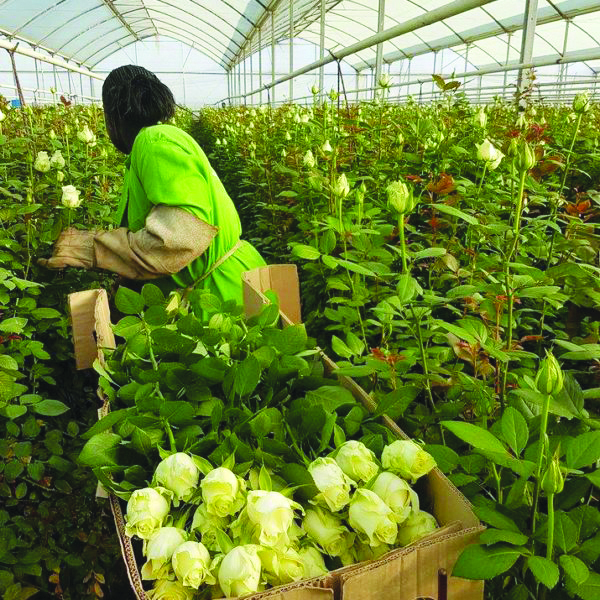November 13, 2025

Sustainable flower farming relies heavily on continuous education for its workforce.
As the industry adapts to challenges like climate change, stricter market requirements, and rapid advancements in technology, equipping employees with up-to-date knowledge is essential.
Today’s markets demand flowers produced through ethical, environmentally responsible methods.
To meet these expectations, workers must understand how to manage resources efficiently, reduce pollution, and uphold high social standards. Without regular training, it becomes difficult for farms to stay competitive, meet certification requirements, or operate responsibly. In short, an informed workforce is central to achieving lasting sustainability in floriculture.
Why Ongoing Training Is Essential in Sustainable Flower Farming
Floriculture has historically relied on resource-intensive practices: extensive water and energy use, synthetic chemical inputs, and labour models that often lacked adequate worker protections. Today, sustainability has become both a moral and market-driven imperative, requiring flower producers to balance environmental conservation, social responsibility, and economic viability.
Meeting this challenge requires more than just technical proficiency in horticulture. Workers across all levels must engage in ongoing learning to operate increasingly complex systems, implement sustainability protocols, and adapt to changing climatic, regulatory, and consumer landscapes.
Without continuous education, employees may lack the ability to use modern technologies effectively, adhere to evolving compliance frameworks, or contribute to on-farm innovation. The consequences are significant: wasted inputs, regulatory breaches, exclusion from certified markets, and reputational risks that can compromise a farm’s long-term viability.
How Education Strengthens Sustainability in Floriculture
Workforce education is not an optional add-on; it is a structural component of sustainable operations. It reinforces each of the three pillars of sustainability: environmental integrity, social equity, and economic resilience.
Environmental Sustainability
Training equips employees with the skills to optimize natural resource use while minimizing ecological harm. For example:
- Sensor-based irrigation systems can reduce water use by 15–25%, preserving watershed ecosystems and lowering operational costs. Workers must be trained to interpret data and fine-tune irrigation schedules based on real-time feedback.
- Integrated Pest Management (IPM) programs depend on workers understanding pest thresholds, beneficial insects, and alternatives to synthetic pesticides, reducing chemical runoff, protecting biodiversity, and safeguarding human health.
- Energy efficiency initiatives, such as automated climate controls or solar-powered systems, require technical knowledge to maintain, troubleshoot, and improve.
- Waste management training fosters better segregation, composting, and recycling practices, contributing to reduced landfill loads and lower carbon footprints.
Education catalyzes the adoption of these tools and ensures that sustainability protocols are not just written policies but active, measurable practices.
Social Sustainability
Worker education underpins fair labour practices and supports employee well-being, inclusion, and dignity:
- Health and safety training, including proper use of PPE, chemical handling, and emergency response, significantly lowers occupational health risks.
- Workplace rights awareness, such as grievance procedures and anti-discrimination policies, enhances transparency and trust between workers and management.
- Gender equity training enables more inclusive workplaces, addressing issues such as wage gaps, promotion pathways, and maternity protections.
- Career development opportunities, including certification programs or on-the-job upskilling, foster retention and motivation which are key elements in maintaining a skilled and stable workforce.
Moreover, many social certification standards such as Fairtrade, GlobalG.A.P. GRASP, or KFC Silver and Gold levels mandate ongoing training for both workers and supervisors. Without it, farms risk failing audits and losing access to key export markets.
3. Economic Sustainability
The economic case for worker education is increasingly clear:
- Operational efficiency improves when trained staff can reduce inputs, manage inventory, prevent post-harvest losses, and maintain quality standards.
- Post-harvest handling training which covers cooling, packaging, and transportation that extends flower vase life and preserves visual quality, leading to higher market prices and customer satisfaction.
- Certification compliance, often tied to access to high-value markets, hinges on documented employee training in sustainability practices.
- Process innovation, whether in soil health management, variety selection, or digital farm tools, depends on a workforce equipped to test, evaluate, and adopt emerging solutions.
In short, educated workers don’t just execute instructions, they think critically, solve problems, and contribute to continuous improvement.
Institutional and Industry Support for Workforce Learning
Recognizing the central role of training in sustainability, several institutions have developed frameworks and programs that support floriculture workforce education at both the local and international levels:
- The American Floral Endowment (AFE), through its Sustainabloom initiative, provides step-by-step guides and training tools tailored to growers, enabling farms of various sizes to integrate sustainability principles aligned with global best practices.
- The Kenya Flower Council (KFC) integrates practical training modules into its audit process covering safe chemical use, biodiversity protection, soil and water monitoring, and proper documentation supporting Kenya’s reputation as a responsible supplier to the European market.
- The Floriculture Sustainability Initiative (FSI) works with growers, traders, retailers, and NGOs globally to harmonize sustainability standards and share knowledge across the supply chain.
- Academic institutions such as Wageningen University, Mississippi State University, and the University of Nairobi provide targeted horticultural sustainability curricula, field research, and graduate programs that feed qualified professionals into the industry pipeline.
- Third-party certification bodies, including MPS, Fairtrade, and Rainforest Alliance, embed mandatory training requirements into their audit criteria, reinforcing education as both a compliance and performance tool.
These efforts demonstrate that sustainability is not an individual farm endeavour, but a sector-wide transformation supported by shared resources and common learning platforms.
The future of sustainable floriculture depends on well-informed, well-trained people. Education empowers employees to manage resources wisely, improve working conditions, and raise product quality. This is not a one-time process.
It must be continuous, cross-cutting, and fully integrated into daily operations, audits, and leadership priorities. Institutions, certification bodies, and industry associations must continue supporting these efforts, but ultimately, it is the commitment of individual farms that will define the pace and scale of progress.
